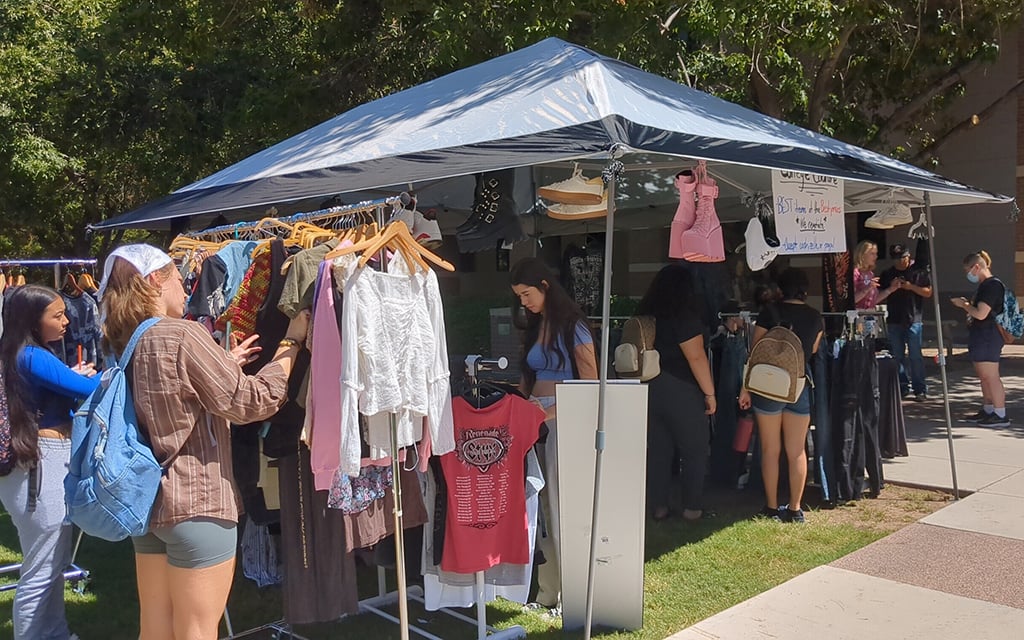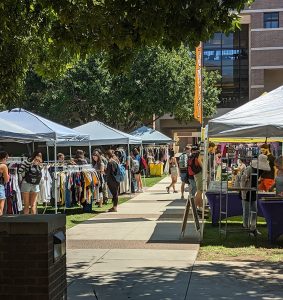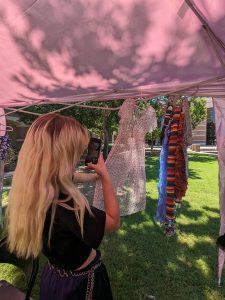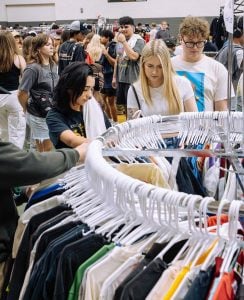
When selling at pop-up markets, vendors can personalize their shops to reflect their own style. “Where I feel like a lot of people go wrong is they try to sell stuff that they don’t care about,” says Isaiah Barajas, co-owner of Ivory House Vintage Shop. “Then you just fall out of love with it.” (Photo by Kate Duffy/Cronkite News)
PHOENIX – If you’ve been to a flea market or visited First Friday in downtown Phoenix, you’ve likely seen booth after booth of independent sellers offering a curated selection of vintage finds.
Vintage reselling has become a popular full-time job for fashion enthusiasts in the past few years, and vintage markets have become a destination for young shoppers hoping to lessen their environmental impact by avoiding fast fashion.
Isaiah Barajas, co-owner of Ivory House Vintage Shop, has been selling vintage clothing for seven years. He started out as an independent seller, selling clothes out of a 10-by-10 booth at a flea market near Grand Canyon University.
Four years ago, he and his brother opened a storefront in Goodyear. They later began hosting a pop-up market in downtown Phoenix on the first Friday of every month, where independent vintage resellers can set up their pop-up storefronts.
“We host about 45 different independent sellers,” he said. “It’s a 15-by-10 space and they get to sell whatever they want inside there.”
Barajas said that in recent years he has noticed a “huge growth” in the number of people pursuing vintage resale as a full- or part-time job.
“I would say in this year, I’ve seen probably triple the amount of sellers that we’ve seen previously,” he said.
Barajas attributes much of this growth to social media; the more people see vintage reselling as a potential business venture, the more inclined they are to start selling as well.
The growth in vintage reselling can also be linked to an overall trend of sustainable fashion growing in popularity.
Sustainable fashion among younger generations

Students at Arizona State University’s West Valley Campus browse the vendors at University Street Market. “They’re the perfect age group to sell the clothes to because they’re more into fashion,” says Eddie Pan, who created the market. (Photo by Kate Duffy/Cronkite News)
According to a report from ThredUp, an online consignment and thrift store, the global secondhand market is growing rapidly. Between 2021 and 2022, the market increased 28%, going from $138 billion to $177 billion. The company estimates that, by 2024, secondhand apparel will account for 10% of the global apparel market.
This trend is largely driven by younger generations. Sustainability is a priority with Generation Z shoppers, 47% of whom refuse to purchase apparel from brands and retailers that aren’t sustainable, according to the ThredUp report.
“Students are becoming more aware of their impact on the planet,” said Larisa May, a frequent vintage shopper and co-editor-in-chief at The Chic Daily, a fashion magazine at Arizona State University. “We want to do what we can to reduce that, and so vintage shopping and shopping sustainably has just become a highlight for our generation.”
Worldwide, the fashion industry is responsible for between 2% and 8% of carbon emissions, according to the UN Environment Program. Additionally, textile dying is a leading source of water pollution. If not resold or recycled, used clothing ends up being burned or buried in landfills, contributing more to fashion’s environmental impacts.
Purchasing secondhand clothing reduces those effects because fewer clothes are being manufactured and introduced into the waste system.
“Especially with social media, our generation sees the environmental impacts and are like, ‘Oh my gosh, I want to help in some way,’” said Olivia Madrid, a writer for The Chic Daily. “Some ways they do that is by thrifting and secondhand shopping.”
Vintage reselling as a full-time job
Eddie Pan has been reselling thrift and vintage items as his full-time job for over 10 years. He began by selling clothing he found at vintage stores online and eventually was able to quit his 9-to-5 job.

Rachel McComas snaps a photo of a dress to upload to her Depop account. “There’s so many clothes floating around that need a home,” she says. (Photo by Kate Duffy/Cronkite News)
“I was selling online, but it was not enough capital,” he said. “I found a flea market and I started selling there, and then it became sustainable for me to do it full time.”
When Pan first moved from Los Angeles to Phoenix five years ago, he noticed that there weren’t as many opportunities for vintage reselling as there were in California. He created University Street Market to appeal to eco-conscious and fashion-savvy students and sellers.
“I felt like it’d be really cool, really awesome to create something for the city, for the school,” he said.
USM used to only hold flea markets on ASU’s Tempe campus but has recently expanded to the West and Downtown campuses and hopes to eventually expand to all four ASU Valley campuses in response to the high demand for secondhand fashion among students.
“They’re the perfect age group to sell the clothes to because they’re more into fashion,” Pan said.
Pan also created USM to foster a community of vintage sellers, something that wasn’t around when he first started selling a decade ago.
“When I was first doing it, it was more like a niche,” he said, but added that in recent years the vintage reselling market has expanded a lot and become a popular business endeavor for people who love fashion and want to work on their own terms.
“With my personal experience, I can tell you the attractiveness to it is probably the freedom,” he said. “Even though you’re giving up a 9-to-5 to pursue something full time, you do it on your own terms. You are your own boss and kind of have to figure things out on your own.”
Rachel McComas is another full-time vintage reseller. She sets up her shop, Rancidresales, at markets like USM, Ivory House and Pickers Playground.
“I’ve always been super into fashion and always wanted to do something in fashion but wasn’t really sure how until I started seeing a lot of other people doing this, so I just kind of hopped on,” she said.

Vintage shoppers look through racks of vintage shirts at an indoor Ivory House Vintage Shop market. (Photo courtesy of Isaiah Barajas)
McComas uses vintage reselling as a means to support herself financially by selling both in-person at markets and online on platforms like Depop, Poshmark, ThredUp and Mercari. Pan does the same and said that, at different times of the year, online sales can be more profitable than in-person sales.
On a good day, according to Pan, vintage sellers can make around $1,000 in sales at flea markets. On bad days, though, they might make under $100, which is why many resellers sell online as well.
“Doing this type of business, there’s a lot of ups and downs and all of it is seasonal,” he said.
“When fall comes, online has been really good. Summer comes, sales slow down dramatically online and I’m doing, like, flea markets, so there’s like a balance.”
When they aren’t busy selling clothes at pop-up markets, McComas and Pan spend their days perusing vintage and thrift stores for items that fit the curated aesthetic of their shops.
“A lot of it, honestly, is my own personal style,” McComas said. “I mainly look for dresses and skirts, very femme attire, but it really just depends on what catches my eye.”
Having a curated style is important in the reselling business, Ivory House’s Barajas said, because it makes a shop stand out and keeps the seller passionate about what they’re doing.
“You get to showcase your style, curate stuff that you would like to sell around your style,” he said. “It’s not like working at the mall where you’re selling whatever everyone else likes. You can just sell what you like.”
